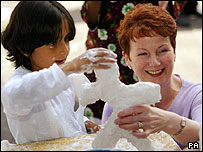
Ms Blears is holding a series of meetings with Muslim groups
|
Downing Street has distanced itself from suggestions ethnic minority groups could be given new titles in an effort to strengthen their identity in the UK.
Some community leaders said they would welcome US-style hyphenated terms such as Asian-British or Indian-British.
But a No 10 spokesman said the idea was not a proposal and was first raised in talks with Muslims to discuss concerns after the London bomb attacks.
Opponents say calling citizens anything other than British would be divisive.
But writer Yasmin Alibhai-Brown, welcomed such a move as a way for people to both show pride in their roots and their status as a Briton.
Ms Alibhai-Brown said she already thinks of herself as British Asian.
'Redefining divisions'
"I never use the term ethnic minority, I think that ghettoises us and I wrote several years ago we should shed it," she told BBC Radio 4's Today Programme.
"But the ethnic minority label is used by governments and by local authorities as a way of describing us and that in turn makes people describe themselves in those terms.
"Why should people not feel they can be British - and feel that their heritage is part of what it means to be British?"
Dr Jeevan Singh Deol, from the School of Oriental and African Studies (SOAS), said introducing new terms would "redefine divisions already there".
"I think it's nonsense and it's actually divisive," he said. "It's silly to say that this is going to unite people.
"If you need to do statistics, like you do in a census, you may need to use fine grain stuff. But for everything else, there's no need to use these terms."
Floating ideas
Home Office Minister Hazel Blears told the BBC the rebranding suggestion was among a "range of ideas" brought up during the first of a series of meetings with Muslim and other community groups.
"This has been raised with me by other people," said Ms Blears, the recently appointed head of a new government commission on integrating minorities.
"What we have to do is have a discussion, find ways in which we can really, as a whole community, as a whole society, be together on the same side," said Ms Blears.
In an interview with the Times, Ms Blears described the use of terms such as Italian-American or Irish-American in US society as "quite interesting".
"I am going to talk to people and ask 'how does that feel?'. It is about your identity and I think it's really important," she told the paper.
"I think it's really important, if you want a society that is really welded together, there are certain things that unite us because you are British, but you can be a bit different too."
Second generation
It was unclear whether other non-Asian communities would also be part of any rebranding exercise, the Times says.
Sir Iqbal Sacranie, general secretary of the Muslim Council of Britain, said efforts to use similar forms of identity in the past have failed.
"What of the second generations? Why should they be defined as other than British?" he told the Times.
Shadow home affairs spokesman Edward Garnier said the growing number of Asian British people in his constituency regarded themselves as British.
"They don't need a government minister to tell them how to describe themselves," he said.

